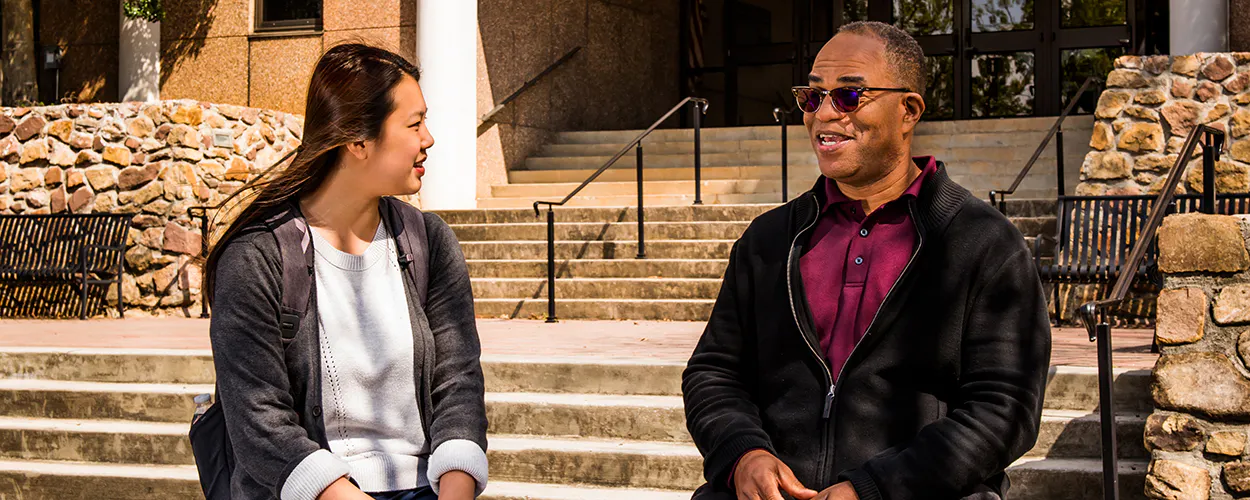Amazing Student: 'You never stop growing'
Cedric Sanders is pursuing his doctorate after decades of gaining life experiences in corporate America, law enforcement, and education.
Degree objective: I'm pursuing my Ph.D. in the Department of Lifelong Education, Administration and Policy. The degree is learning, leadership and organization development, but my focus is adult education.
Hometown: Lawrenceville, Georgia
Graduation: Summer 2019
First tell me a little bit about your other education experiences leading up to when you came to UGA. I have an unusual story—I started college back in my 20s. I was in corporate America when I started my undergrad, I was a business administration major, and then I went into law enforcement. So, I was in the public safety sector for many, many years and a former police officer. Upon entering into that field, I didn't finish my education, so moving further down my journey, after changing careers, I was diagnosed with cancer. During my cancer recovery, I felt the need to go back to school. I went back to school, I finished my bachelor's and I went into my master's program right after my bachelor's program (both at Troy University). After I finished my master's program, I felt the call to go get a terminal degree, so here I am.
What drew you to UGA and to get a Ph.D.? My advisor in my master's program is an alumna of UGA, and she was in our program here. Her major professor is my major professor, so there's a connection there. I've always been a Dawg fan. Definitely Dawg Nation and the opportunity to come to a research one, flagship university to do this is wonderful.
You're also a graduate research assistant—what do you like best about it? We work with the technical college system of Georgia to help facilitate the adult education program reviews. It puts me in contact with the audience that I'm interested in, as far as my research. Just the opportunity to be able to see the practice side. You do the research, you're in the literature on adult education and what adult learners need, but to actually work and help the technical college system of Georgia and facilitate their programs brings it full circle.
What have you done during the time between your master's and Ph.D.? I worked in Gwinnett county school systems—I actually drove a school bus! Prior to leaving law enforcement, I was a school resource officer at DeKalb county schools. So, I had the opportunity to be in the P-12 setting. I actually spent time working with at a non-profit, where we worked with teen parents in the metro Atlanta area.
What are some of the big takeaways from your time as a police officer? Even as a police officer, I was always about community. I was doing a lot of funding for community policing. I had the opportunity to work with the community policing liaison between the community, and I actually worked in the school systems. I guess I'm in the people business. As a police officer, with the notion of protecting and serving, my passion was really to give back to the community. So (being a police officer) offered me the opportunity to do that.
I hear a lot about education within your experiences. What draws you to the field? Just the opportunity to grow. To me, education gives you a platform to enter into spaces you otherwise would not have been able to, as well as it gives you the words, the terminology, to have conversations with people, and how to have those courageous conversations. You never stop growing! I guess it's ironic that I'm in the lifelong learning department because that's what we do.
You also started a black men's group on campus. Can you tell me a little bit more about that and what has been the most rewarding part about that experience? Part of being a doctoral student is that a Ph.D. is not done. It's not designed to do it alone, and there's a notion of community to get you through it. However, as we all fall within our cultural spaces, one of the things that I've noticed, even within my research, is that Ph.D.s in the United States are scarce. I think less than 2 percent of the population. So, in that number, I belong to a minority group; the number of black males who have their Ph.D. is even smaller. So, I just felt the need to create a space where I can have people to talk with and be able to talk to other people who look like myself.
What do you like to do in your free time? I like to sit outside till 1 o'clock in the morning by a fire. Listen to jazz music, think about my research, and hang out. Hang out with my friends, my colleagues, my wife. Meditate!
What's next in your master plan? I don't know! You know, one of my colleagues said that about the doctoral journey, is like asking a person who's climbing Mount Everest, "What do you do when you stand at the top of the summit?" My major professor says that nobody really knows what they're going to be doing after a Ph.D., but doors will open that you never even knew were there. But if I had to answer the question, I guess I'd say that I want to continue my life's passion of working with people, working with others. I'd love to work at UGA, but you know, we'll see!
